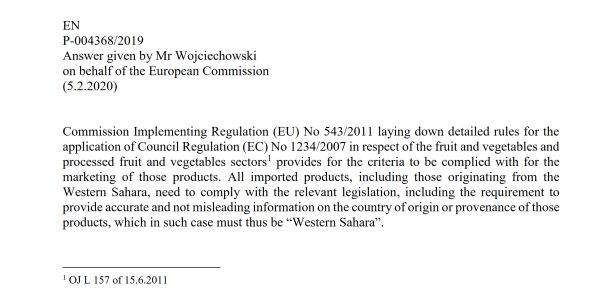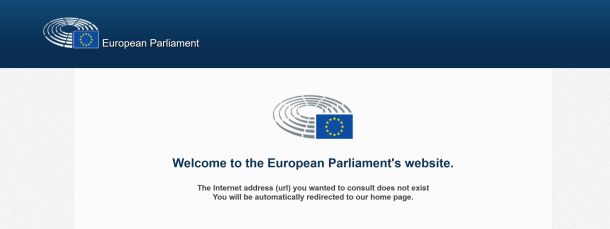
The leading Parliamentary Committee sets consent of the Saharawi people as a condition for endorsing the Western Sahara trade deal that the Commission is presently negotiating with Morocco.
Read also: WSRW demands Commission for answers regarding fake consultation in Western Sahara
On 20 February, the EU Commission briefed the European Parliament's International Trade Committee on the provisional outcome of its ongoing negotiations with Morocco to secure Western Sahara trade flows. This, according to the Commission, would be possible through an amendment of the existing protocols of the EU-Morocco agriculture agreement.
The Parliament has so far expressed its shock, as the Commission had finished the negotiations with Morocco over a new agreement for Western Sahara only days after briefing the parliament last time. The Court of Justice had in 2016 judged that no trade agreement could cover Western Sahara unless the representatives of the territory had consented to it.
The International Trade committee of the Parliament raised one fundamental queston: where is the consent of the people of Western Sahara?
During the meeting held on 20 February in the European Parliament, 8 out of 9 MEPs expressed their dissatisfaction, disbelief and disappointment towards the conduct of the European Commission during these negotiations.
The Chair of the INTA Committee, German Socialist MEP Bernd Lange, opened the agenda item by saying he was surprised by the marginal role to which the European legislative body has been relegated by the EU executive. “It seems there was a deal behind closed doors" Lange affirmed from the outset of the discussion.
The Commission’s debriefing to the Trade committee was marred by contradictions. To name just a few: one EU official talked about “population”, the other mentioned “the people”; the draft agreement was finalized on January 31, but EEAS Senior official Vincent Piket said that he started a dialogue with the Polisario Front in "early February".
When Mr. Piket ended his presentation, the dismay was transversal, across the political spectrum: S&D, ALDE, Greens/EFA and GUE (no EPP MEPs expressed themselves during the meeting).
The Commission explained that it had been in contact with a number of bodies and institutions with interest in Western Sahara. However, these are all Moroccan, and totally irrelevant to the Western Sahara issue.
Western Sahara Resource Watch today sent a letter to EEAS in which we ask 17 questions about the baseless consultation process, referring to the comments given by EEAS in the INTA Committee. Read all about that here.
Chair Lange continued, claiming to be "really unsatisfied" and labelled DG TAXUD's approach as "unacceptable".
Of critical importance for the forthcoming vote by the Parliament on the outcome of the negotiations, MEP Patricia Lalonde (ALDE), Standing Rapporteur on the dossier, outlined three conditions for Parliament’s approval of the deal: 1) the territorial application of the agreement to Western Sahara must be explicitly stated; 2) the agreement must be to the benefit of the local populations, notably in economic terms; 3) the people of Western Sahara must give its consent.
On the latter condition, the Rapporteur emphatically stressed the term “people” of Western Sahara and insisted that the Commission must "ensure the representability of the organisations consulted in the process”.
MEP Klaus Buchner (Greens) sought to simplify the discussion with a questions and answers session: "what did the ECJ say? The people of Western Sahara must agree. And, what is the European Commission doing? Talking to the occupying government.” As a matter of fact, it cannot be clearer than that, continued Buchner: “the European Commission is disregarding the judgement, the rule of law and human rights, while protecting the occupiers' economic benefits”.
It is unacceptable for MEPs that “the Commission wants Parliament to vote on something illegal”, as MEP Lola Sanchez (GUE, Spain) summarised it.
For this reason, the Belgian socialist Maria Arena proposed, "we in the INTA committee should ask the ECJ about the conformity of what the Commission negotiated. If it is in line with the verdict, we can conclude the agreement, but if it is not, then it will be ridiculous to ask to the MEPs to vote on something that is not legally valid".
All intervening MEPs critizised the Commission, with the exception of MEP Ayala Sender, who recalled that the problem of Western Sahara needs to be solved at UN level and that Europe cannot decide who the legitimate representatives are. It could be added that the UN resolution referring to Polisario as the representative is mentioned in EU the Court judgments on the matter.
As a conclusion, Mr Piket assured the parliamentarians that, "we take good note of what you [MEPs] said".
For more information watch the discussion online (from 17.25.50).
EU Commission backtracks on labelling Western Sahara goods
What is EU's position on labelling of products from occupied Western Sahara? The EU Commission has now for the third time published a response to a parliamentary question on the matter, but the latest version fails to address the question.
Why does this EU statement keep disappearing?
A clarification by the EU Commission on labelling of products from Western Sahara was published, then removed, then published again and has now been removed again from EU websites.
EU reaffirms: Western Sahara products to be labelled as such
Two weeks ago, the EU Commission announced that products from Western Sahara should be labelled accordingly, only to withdraw that statement the very next day. Today, the Commission reaffirms its original position.
Spectacular backtracking by EU Commission on Western Sahara labelling
On 5 February 2020, the EU Commission announced that products from Western Sahara should be labelled accordingly. But about 24 hours later, all traces to that statement had been removed from EU websites.



